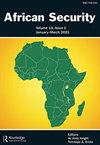In Memoriam — Professor Pius Adesanmi (1972-2019)
IF 1.3
Q2 POLITICAL SCIENCE
引用次数: 0
Abstract
News of the tragic death of Professor Pius Adesanmi in the Ethiopian Airlines Flight 302 crash on 10 March 2019 alongside all the 156 passengers and crew (representing some 35 nations) sent shock waves around the world. Nigerian-born Professor Adesanmi was until his death the director of the Institute of African Studies, Carleton University. He was also a close friend to one of us (Temitope). Professor Adesanmi was an outstanding and highly decorated scholar who was a recipient of the inaugural Penguin Prize for African writing in the non-fiction category in 2010. He also received the prestigious Canada Bureau of International Education (BIE) Leadership Award in 2017. Professor Adesanmi was a distinguished teacher, public intellectual, speaker, columnist, satirist, and writer. Professor Adesanmi, a brilliant post-colonial scholar, was very much at the peak of his career and the prime of his life. Statements from top administration officials of Carleton University, Ottawa speak to the texture of his scholarship and the quality of our loss. For instance, a statement by Benoit-Antoine Bacon, the president and vice-chancellor of Carleton University notes that “Pius was a towering figure in African and post-colonial scholarship. Our thoughts and prayers are with his family and all those who knew and loved him, and with everyone who suffered a loss in the tragic crash in Ethiopia”. Carleton’s Dean of the Faculty of Arts and Social Sciences, Pauline Rankin also states that Professor Adesanmi “worked tirelessly to build the Institute of African Studies, to share his boundless passion for African literature and to connect with and support students. He was a scholar and teacher of the highest caliber who leaves a deep imprint on Carleton.” Professor Adesanmi was a true 21 century Pan-Africanist who enjoyed spectacularly broad and transnational followership. His articles and posts on social media were part of the daily diet of many people around the world. He was a thorn in the flesh of Africa’s political class, especially the Nigerian political elite. Everyone who knew Adesanmi was struck by his decency, humor, intellect, and capacity to connect with others. Muyiwa Balogun-Adesanmi, the widow of Adesanmi, notes that Professor Pius Adesanmi’s “public persona was matched with an uncommon grace, devotion to family and contagious love in the private sphere...‘Bola was a real gentleman, a fine father, and an amazing husband.” Our inaugural editorial was a tribute to James J. Hentz, the founding editor-in-chief of African Security. A piece written by James Hentz has been published in Small Wars and Insurgencies (also from the remarkable stable of Taylor & Francis). Hentz problematizes simplistic portrayals of the ascendance and spread of Boko Haram in the Lake Chad Basin. He argues that the Boko Haram conflict should be understood through the lenses of three concentric circles. The three circles comprise the particularities of the local origins, a pan-regional Islamic movement, and external influences and alliances. Hentz’s posthumous article is an invaluable contribution to scholarship on Boko Haram. This issue of African Security contains four timely articles. First, Anne Speckhard and Ardian Shajkovci draw on interviews with Al-Shabaab members and their families to interrogate the motivations for joining the terrorist group. The article also provides AFRICAN SECURITY 2019, VOL. 12, NO. 1, 1–2 https://doi.org/10.1080/19392206.2019.1611713纪念——皮乌斯·阿德桑米教授(1972-2019)
皮乌斯·阿德桑米教授在2019年3月10日埃塞俄比亚航空公司302航班空难中不幸遇难,156名乘客和机组人员(代表约35个国家)遇难的消息在世界各地引发了震动。出生于尼日利亚的阿德桑米教授生前一直担任卡尔顿大学非洲研究所所长。他也是我们(Temitope)的亲密朋友。阿德桑米教授是一位杰出且备受赞誉的学者,曾于2010年获得首届企鹅非小说类非洲写作奖。2017年,他还获得了著名的加拿大国际教育局(BIE)领导力奖。阿德桑米教授是一位杰出的教师、公共知识分子、演说家、专栏作家、讽刺作家和作家。阿德桑米教授是一位杰出的后殖民主义学者,他正处于职业生涯的巅峰和人生的黄金时期。渥太华卡尔顿大学高级行政官员的声明谈到了他的奖学金结构和我们的损失。例如,卡尔顿大学校长兼副校长Benoit Antoine Bacon在一份声明中指出,“庇护是非洲和后殖民地学术界的杰出人物。我们为他的家人、所有认识和爱他的人,以及在埃塞俄比亚悲惨坠机事件中遭受损失的每一个人祈祷”。卡尔顿大学艺术与社会科学学院院长Pauline Rankin还表示,Adesami教授“不懈努力,建立了非洲研究所,分享了他对非洲文学的无限热情,并与学生建立了联系和支持。他是一位最优秀的学者和教师,给卡尔顿大学留下了深刻的印象。”。“阿德桑米教授是一位真正的21世纪泛非主义者,拥有极其广泛的跨国追随者。他在社交媒体上的文章和帖子是世界各地许多人日常饮食的一部分。他是非洲政治阶层的眼中钉,尤其是尼日利亚政治精英。每个认识阿德桑米的人都被他的正派、幽默、智慧和与他人建立联系的能力所打动。阿德桑米的遗孀穆伊瓦·巴洛贡·阿德桑米指出,皮乌斯·阿德桑米教授的“公众形象与不同寻常的优雅、对家庭的忠诚和私人领域富有感染力的爱相匹配……”博拉是一位真正的绅士、一位优秀的父亲和一位了不起的丈夫。“我们的就职社论是对《非洲安全》创始主编詹姆斯·J·亨茨的致敬。詹姆斯·亨茨写的一篇文章发表在《小战争与叛乱》(同样来自泰勒和弗朗西斯的杰出马厩)上。亨茨对博科圣地在乍得湖盆地的崛起和蔓延进行了简单化的描述。他认为,博科圣地冲突应该通过三个同心圆来理解。这三个圈子包括当地起源、泛地区伊斯兰运动以及外部影响和联盟的特殊性。亨茨死后的文章是对博科圣地学术的宝贵贡献。本期《非洲安全》包含四篇及时的文章。首先,Anne Speckhard和Ardian Shajkovci利用对青年党成员及其家人的采访,审问加入恐怖组织的动机。文章还提供了《2019非洲安全》,第12卷,第1、1–2期https://doi.org/10.1080/19392206.2019.1611713
本文章由计算机程序翻译,如有差异,请以英文原文为准。
求助全文
约1分钟内获得全文
求助全文

 求助内容:
求助内容: 应助结果提醒方式:
应助结果提醒方式:


